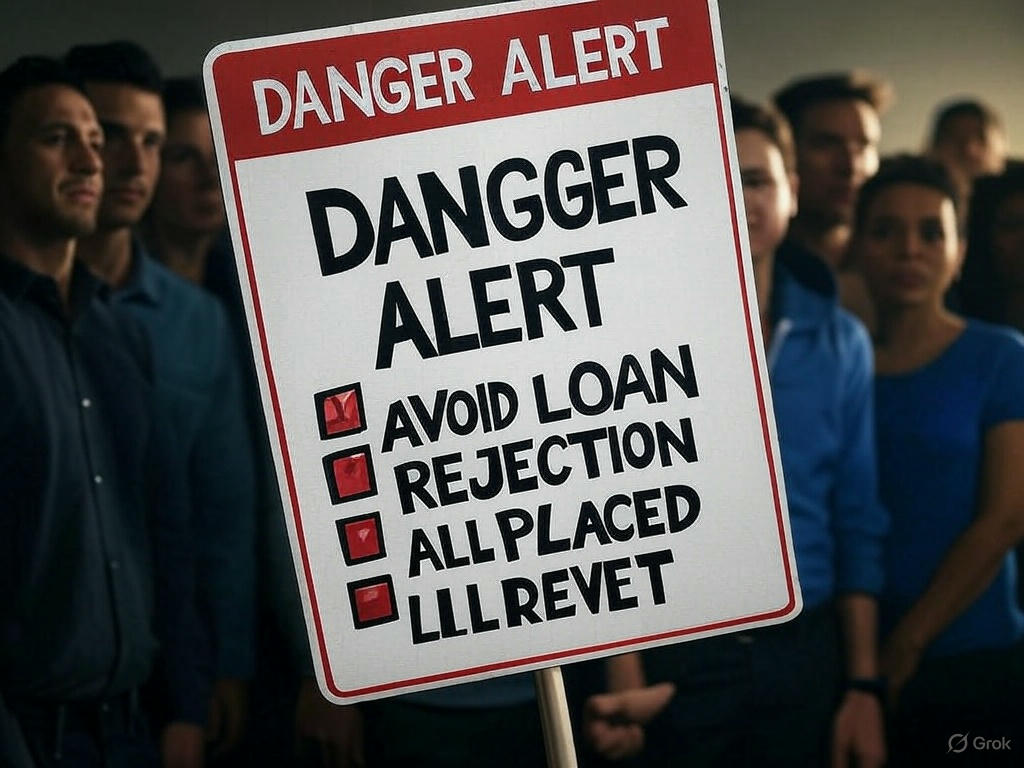Ever been excited about getting a loan, only to face the dreaded rejection email? Oof, that stings! But don’t worry, you’re not alone—loan rejections happen to the best of us. The good news? You can totally avoid it with a bit of preparation and the right strategy. Let’s break it down so you can increase your chances of getting that “approved” stamp!
Why Do Loans Get Rejected?
Before we fix the problem, let’s understand why it happens. Banks and lenders reject applications for reasons like:
- Low Credit Score – Your credit history is like your financial report card. If it’s bad, lenders think you won’t repay.
- High Debt-to-Income Ratio (DTI) – If you’re already drowning in debt, why would they throw you another life jacket?
- Unstable Employment History – Lenders love stability. Frequent job changes? Big red flag.
- Incomplete Documentation – Messy paperwork = immediate rejection.
- Low Income – If your earnings aren’t enough to cover the loan, they’ll shut the door.
Pro Tips to Avoid Loan Rejection
1. Know Your Credit Score (And Improve It!)
Think of your credit score as your financial reputation. A low score can instantly ruin your chances. Ideally, you want a 750+ score for smooth approval.
How to Improve It?
- Pay your bills on time. Late payments = bad news.
- Reduce your credit card usage. (Maxing out is a huge no-no.)
- Check for errors in your credit report. Yes, mistakes happen, and they can cost you big time.
- Keep old credit accounts open (long credit history = good impression).
2. Lower Your Debt-to-Income Ratio
If lenders see that a big chunk of your income is already going toward EMIs, they’ll hesitate to lend more.
How to Fix This?
- Pay off some existing debts before applying.
- Increase your income (side hustles, freelancing, anything helps!).
- Don’t take multiple loans at once—space them out.
3. Maintain a Stable Job and Income
Jumping from one job to another frequently? That’s a red flag for lenders. They want to see at least 2-3 years of stable income.
Quick Fixes:
- If possible, avoid applying for a loan right after switching jobs.
- Show additional income sources (freelance work, rental income, etc.).
- Get salary credits in your bank account—cash payments don’t count!
4. Apply for the Right Loan Amount
Let’s be real—applying for a ₹50 lakh loan on a ₹30K salary is just wishful thinking. Be practical with your loan amount.
Golden Rule:
- Keep your EMIs below 40% of your monthly income.
- Use online loan eligibility calculators before applying.
- If needed, apply for a joint loan with a spouse or parent for better eligibility.
5. Get Your Documents Right
Incomplete paperwork is one of the easiest ways to get rejected. It’s like going to an exam without a pen—you’re setting yourself up for failure.
Checklist:
- Identity proof (Aadhar, PAN, Passport)
- Address proof (Utility bill, rental agreement)
- Income proof (Salary slips, ITR, bank statements)
- Employment proof (Offer letter, Form 16)
6. Don’t Apply for Multiple Loans Simultaneously
Applying for multiple loans at once makes you look desperate—and lenders don’t like that. Each application triggers a hard inquiry, which can drop your credit score.
Smart Move:
- Compare lenders first, then apply to the most suitable one.
- Wait for a response before applying elsewhere.
7. Choose the Right Lender
Not all lenders have the same rules. Some have stricter policies, while others are more lenient.
What to Look for?
- Compare interest rates (lower = better, obviously!).
- Check eligibility criteria before applying.
- Read customer reviews—hidden fees are real!

FAQ: Quick Answers to Common Questions
Q1: Can I get a loan with a low credit score?
Yes, but expect higher interest rates or a lower amount. Try NBFCs or secured loans (like gold or property loans) if banks reject you.
Q2: How long should I wait before reapplying after rejection?
At least 6 months. Use this time to fix issues like low credit scores or high debt.
Q3: Does my CIBIL score affect every loan application?
Absolutely! Banks check it first. A poor score can ruin your chances.
Final Thoughts: Get That Loan Approved!
Loan rejection isn’t the end of the world. With smart financial habits, you can turn things around. Fix your credit score, lower your debts, choose the right lender, and ensure proper paperwork—your dream loan is within reach!
Ready to apply? Share your loan experiences in the comments below! Have questions? Ask away!

